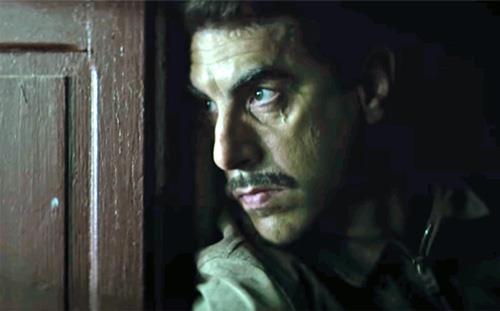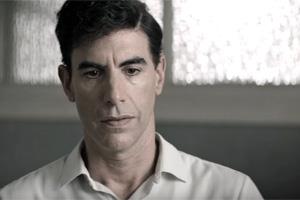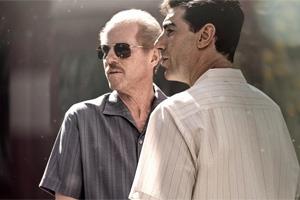
Many years ago, I stayed at a kibbutz in Israel's Golan Heights with a clear view of Syria sprawled out below, as far as the eye could see, predominantly flat agricultural lands. Tensions were high. Christian Phalange militias had just massacred between 500 and 3,500 Palestinian refugees at the Sabra and Shatila refugees camps in neighboring Lebanon, not far away, and for a visiting westerner, it was a sudden lesson in geo-global politics and the intractable dispute over land in that corner of the Middle East. There was talk that the Soviets were agitating the situation in Syria. My Israeli friends were circumspect about Syria and Lebanon but positively terrified of the Soviet Union. If Soviet Russia decided to deal with Israel once and for all, as they had threatened to do on numerous occasions, my Israeli friends reasoned there was nothing they could do about it, no matter how hard they fought or how deep they dug in. That was the real reason Israel in the early 1980s relied so heavily on the US for, well, everything.
I would've made a lousy spy.
 When a convoy of tanks rumbled through the kibbutz one night, very late at night, I slept right through it. There was talk of military movement across the border, deep inside Syrian lines, I was told in the morning. The tanks were being moved into place in case there was a confrontation, but it turned out to be a false alarm.
When a convoy of tanks rumbled through the kibbutz one night, very late at night, I slept right through it. There was talk of military movement across the border, deep inside Syrian lines, I was told in the morning. The tanks were being moved into place in case there was a confrontation, but it turned out to be a false alarm.
What I do remember was that the Golan Heights — disputed territory at the time, and disputed to this day — had an unobstructed view of "the enemy below." On a clear day, it was said, you could see all the way to Damascus. I remember thinking the Israelis were fortunate to control the high ground, but as I later learned, luck had nothing to do with it.
Days ago, while binge-watching Sacha Baron Cohen's intense, deeply layered performance as Israeli spy Eliyahu Cohen in the fine Netflix drama The Spy, it was almost impossible for me to not marvel at how writer-director Gideon Raff — creator of the original Israeli series that spawned Showtime's Emmy Award-winning Homeland— captured the look and feel of the place, right down to the harsh glare of the desert sun through clouds of white chalk dust and the calm, lazy blue shimmer of the Sea of Galilee. At the time, the Sea of Galilee, fed by an underwater spring and nominally fed into by the Jordan River, was Israel's only source of fresh water. Whoever controlled the tap to the Sea of Galilee, in theory, controlled the whole of Israel.
Syria dug in on one side, and Israel dug in on the other, and it's during that tense standoff that The Spy begins its story. At the time The Spy is set, in the early 1960s, the Golan Heights was part of Syria. It was Syrians who peered down, all-seeing, on Israeli military positions, and not the other way around.
 Among its many attributes, The Spy does a remarkable job of filling in the gaps in history, while at the same time telling a taut, tension-filled story about an electronics engineer who volunteers with the Mossad secret service to infiltrate Syria as a well-to-do wheeler-dealer and expat Egyptian of Syrian ancestry. Eli Cohen became Kamel Amin Thaabet, a patriot to the Arab cause who ran an "import-export" business, who wins the favor of well-placed elites deep inside the Syrian military. (His Israeli handlers were mindful to splash the cash, so Cohen could pass himself off as one of the filthy rich and make it easier for him to be accepted into high society in Damascus; money has a way of opening all but the tightest doors.)
Among its many attributes, The Spy does a remarkable job of filling in the gaps in history, while at the same time telling a taut, tension-filled story about an electronics engineer who volunteers with the Mossad secret service to infiltrate Syria as a well-to-do wheeler-dealer and expat Egyptian of Syrian ancestry. Eli Cohen became Kamel Amin Thaabet, a patriot to the Arab cause who ran an "import-export" business, who wins the favor of well-placed elites deep inside the Syrian military. (His Israeli handlers were mindful to splash the cash, so Cohen could pass himself off as one of the filthy rich and make it easier for him to be accepted into high society in Damascus; money has a way of opening all but the tightest doors.)
What price, though, does a loving family man, a devoted husband with a young wife pregnant with their first child, pay when he has to turn his back on everything and everyone he's ever loved and become someone else?
The Spy does an eerily effective job of showing how immersing oneself in another person's soul starts to eat away at one's own soul in the process. These are themes similar to those Steven Spielberg tackled in his film Munich— arguably his most underrated film — about Israeli undercover agents tasked with tracking down and killing the perpetrators of the Palestinian terrorists behind the 1972 Munich Olympics massacre of Israeli athletes.
 The Spy is exceedingly well made, and well written. There are few if any subtitles. The dialogue is in heavily accented English, and while that sounds awful in theory, it works well in practice. Noah Emmerich, so familiar as next-door-neighbor and dedicated FBI agent Stan Beeman in The Americans, is chameleonlike in the thankless role of Cohen's Mossad handler in The Spy, trying to keep the operation both secret and running smoothly while lying to Cohen's wife about his whereabouts and what he's really doing. (Emmerich incidentally is not Israeli, though you wouldn't know it from watching him and listening to him in The Spy; he was born in New York City, in 1954, and today lives in Greenwich Village.)
The Spy is exceedingly well made, and well written. There are few if any subtitles. The dialogue is in heavily accented English, and while that sounds awful in theory, it works well in practice. Noah Emmerich, so familiar as next-door-neighbor and dedicated FBI agent Stan Beeman in The Americans, is chameleonlike in the thankless role of Cohen's Mossad handler in The Spy, trying to keep the operation both secret and running smoothly while lying to Cohen's wife about his whereabouts and what he's really doing. (Emmerich incidentally is not Israeli, though you wouldn't know it from watching him and listening to him in The Spy; he was born in New York City, in 1954, and today lives in Greenwich Village.)
The casual viewer could be forgiven for thinking that events in the haze of faraway Syria and Israel in 1965 could not possibly have any relevance to the world today, and yet that's another way The Spy surprises. It's as tense and tightly wound as anything in John le Carré's fictional world in The Night Manager — one of my favorite limited series of the past ten years — and yet it has a lot to say, whether deliberate or accidentally, about the geo-global politics of that region today. Syria was always a political quagmire — no news flash there — but there's something especially eerie about binge-watching The Spy while reading headlines about Arab nations' joint condemnation of Israeli Prime Minister Benjamin Netanyahu's just-announced plan to annex large portions of the occupied West Bank — in the middle of a re-election campaign, no less. Recently, Netanyahu pledged to apply Israeli sovereigntyover the Jordan Valley and the northern Dead Sea if he's returned to office following this week's general election.
Yes, The Spy is set in the distant past, in the era of reel-to-reel tape recorders and Pontiac GTOs, but it is as relevant today as Gideon Raff’s Prisoners of War was in 2010, and the Prisoners spinoff Homeland was in 2011. This is bracing, compelling stuff that works equally well as a history lesson and pulse-pounding espionage thriller.